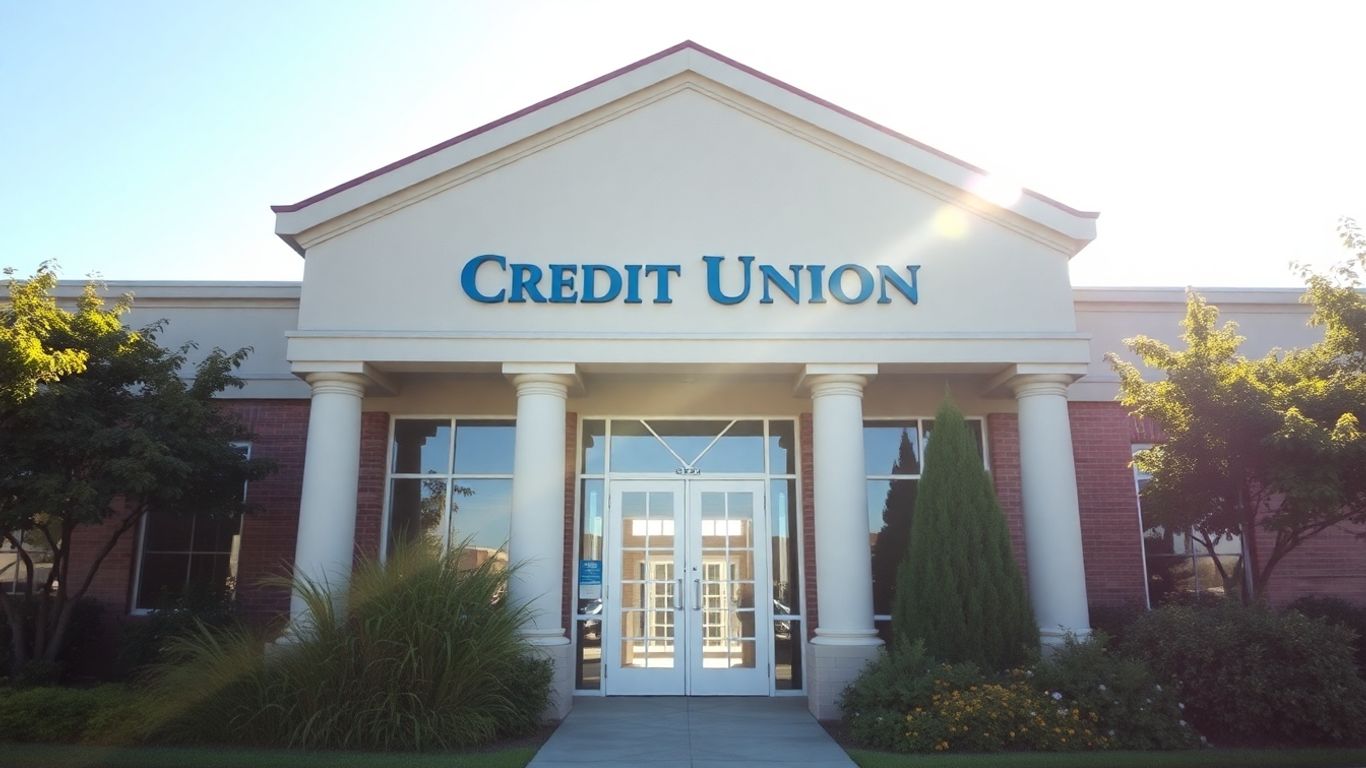Unlock Savings: Explore Credit Union Refinance Mortgage Rates Today
November 19, 2025
Explore credit union refinance mortgage rates today to unlock savings. Discover benefits, options, and how to secure the best rates.

Thinking about changing your current mortgage? Refinancing with a credit union might be a good move. Credit unions often provide competitive credit union refinance mortgage rates, and they can offer a more personal touch than big banks. Let's explore what you need to know to find the best deal for you.
Key Takeaways
- Credit unions can offer competitive credit union refinance mortgage rates, sometimes with better terms than traditional lenders.
- When refinancing, consider factors like your credit score, loan type, and the current economic climate.
- Refinancing can help you get a lower interest rate, reduce your monthly payment, or access your home's equity.
- To get the best credit union refinance mortgage rates, compare offers from several credit unions and be prepared with your financial documents.
- Always calculate the break-even point to ensure the savings from refinancing outweigh the closing costs.
Understanding Credit Union Refinance Mortgage Rates
Thinking about refinancing your mortgage? It's a big decision, and understanding the rates is the first step. Credit unions often have competitive refinance mortgage rates, and it's worth looking into what they offer. Refinancing means you're essentially getting a new loan to pay off your old one, usually to get a better interest rate or change your loan terms. It's not just about the advertised rate, though; there are a few things that actually affect the rate you'll be offered.
Current Refinance Rate Averages
Rates can change daily, and they're influenced by a lot of things happening in the economy. As of November 15, 2025, the national average for a 30-year fixed refinance was around 6.66%, and for a 15-year fixed, it was about 6.05%. Keep in mind these are averages, and your specific rate could be higher or lower. Credit unions might offer rates that are a bit different from these national figures. For example, some credit unions might advertise rates as low as 5.500% for a 15-year fixed refinance, but these often come with specific conditions.
Here's a general idea of what rates looked like recently:
Remember, these are just examples. Your actual rate depends on many personal factors and the specific lender.
Factors Influencing Your Refinance Rate
So, what makes one person's rate different from another's? A few key things come into play. Your credit score is a big one; a higher score generally means a lower rate. The loan-to-value (LTV) ratio, which is the amount you owe on the mortgage compared to the home's current value, also matters. If you have a lot of equity, you might get a better rate. The type of loan you choose – fixed or adjustable – and the loan term (like 15 or 30 years) will also affect the rate. Lenders also look at your income and employment history. It's a mix of your financial health and the specifics of the loan itself.
When to Consider Refinancing Your Mortgage
Deciding if refinancing makes sense isn't always straightforward. A good rule of thumb is if you can lower your interest rate by a full percentage point or more, it's probably worth looking into. If interest rates have dropped significantly since you got your current mortgage, that's a prime time to consider refinancing. It can also be a good idea if your financial situation has improved, perhaps with a higher credit score or more stable income, allowing you to qualify for better terms. Another reason might be to change your loan type, like moving from an adjustable-rate mortgage to a fixed-rate one for payment stability. You might also consider it if you want to shorten your loan term to pay off your home faster or if you need to tap into your home's equity. Refinancing your mortgage with a credit union can lead to better rates and terms. Credit unions often provide more favorable conditions for home loan refinancing compared to traditional lenders. Consider a credit union like VCU for your mortgage refinance needs to potentially save money and improve your loan terms.
Benefits of Refinancing with a Credit Union
Lower Interest Rates
When you're looking to refinance your mortgage, one of the biggest draws is the chance to snag a lower interest rate. Credit unions often have an edge here. Because they're not-for-profit organizations, their focus is on serving their members rather than maximizing shareholder profits. This can translate into more competitive rates on loans, including mortgages. Getting even a half-percent or a full percent lower on your interest rate can save you a significant amount of money over the life of your loan. It's not just about the monthly payment, though that's a big part of it. It's about the total interest paid. A lower rate means more of your payment goes towards the principal, helping you build equity faster.
Personalized Member Service
Forget the feeling of being just another number. Credit unions pride themselves on offering a more personal touch. When you walk into a credit union branch or call them up, you're likely to speak with someone who knows you or at least takes the time to get to know your situation. They're invested in your financial well-being because you're a member, not just a customer. This can make the refinancing process feel less stressful and more like a partnership. They're there to answer your questions, explain the details, and guide you through the steps without the pressure you might feel at a big bank.
Community-Focused Lending
Credit unions are deeply rooted in the communities they serve. They often reinvest profits back into the local area through various programs and initiatives. When you choose to refinance with a credit union, you're supporting a local institution that's committed to the economic health of your neighborhood. This community focus can also mean they have a better understanding of local housing markets and may offer more flexible lending options tailored to the needs of people in that specific area. It's a way to keep your money working for your community while also working for your financial goals.
Exploring Your Refinance Options

Refinancing your mortgage isn't a one-size-fits-all deal. There are different types of refinance loans, and picking the right one really depends on what you're trying to achieve. It's not just about getting a lower rate, though that's often a big part of it. You might be looking to change how long you have to pay off the loan, or maybe you need some cash for a big project.
Fixed-Rate Refinance Options
This is probably the most common type of refinance. With a fixed-rate mortgage, your interest rate stays the same for the entire life of the loan. This means your monthly principal and interest payment will never change. It offers a lot of predictability, which is great if you like knowing exactly what your housing payment will be each month, year after year. If current rates are lower than what you're paying now, refinancing into a fixed-rate loan can lock in those savings for good.
Adjustable-Rate Mortgage Refinance
An adjustable-rate mortgage, or ARM, starts with a lower interest rate for a set period, say five or seven years. After that introductory period, the rate can go up or down based on market conditions. Refinancing into an ARM might make sense if you don't plan to stay in your home for a long time, or if you expect interest rates to fall in the future. It can give you a lower initial payment, but there's always the risk that your payments could increase later on.
Cash-Out Refinance Opportunities
If your home's value has gone up since you bought it, you might have built up some equity. A cash-out refinance lets you borrow more than you currently owe on your mortgage, and you get the difference in cash. People use this money for all sorts of things – maybe a home renovation, paying off high-interest debt, or even funding education. It's like tapping into your home's value to get funds for other needs. Just remember, borrowing more means a larger loan balance and potentially higher monthly payments, so make sure it fits your budget.
When you're looking at refinancing, it's smart to think about the long game. How long do you plan to stay in the house? What are your financial goals for the next few years? Answering these questions can help you choose the refinance option that best fits your life right now and down the road.
How to Secure the Best Credit Union Refinance Rates

So, you're thinking about refinancing your mortgage, and you want to make sure you get the best deal possible, especially from a credit union. That's smart! It's not just about picking the first offer you see. There are a few things you can do to really improve your chances of snagging a great rate and terms.
Improve Your Credit Score
Your credit score is a big deal when it comes to mortgage rates. Lenders see it as a sign of how likely you are to pay back a loan. The higher your score, the less risky you appear, and the better the interest rate you'll likely get. If your score isn't where you want it to be, focus on improving it before you apply.
- Pay down credit card balances: Keeping your credit utilization low can make a noticeable difference.
- Settle any overdue bills: Make sure all your past-due accounts are current.
- Avoid opening new credit accounts: Too many new accounts in a short period can temporarily lower your score.
- Check your credit report for errors: Sometimes, mistakes can drag your score down. Dispute any inaccuracies you find.
Getting your credit in good shape beforehand is one of the most impactful steps you can take. It shows lenders you're a responsible borrower and can lead to significant savings over the life of your loan.
Compare Offers from Multiple Lenders
Don't just go with the first credit union you talk to. Different lenders have different rates and fees, even for borrowers with similar financial profiles. It pays to shop around. Credit unions, in particular, might have unique member benefits or local focuses that make them a good fit, but you still want to see what else is out there.
- Reach out to several credit unions: Ask for their current refinance rates and a breakdown of all associated costs.
- Consider other types of lenders too: While you're focused on credit unions, briefly looking at banks or online lenders can give you a broader perspective. You might find a great deal that helps you decide if a credit union is still your best bet.
- Use online tools: Many websites allow you to compare current 15-year mortgage refinance rates from various institutions side-by-side.
Gather Necessary Documentation
Having all your paperwork ready will speed up the application process and make you look more organized to the lender. This can sometimes help in getting approved faster or even securing better terms.
- Proof of income: Recent pay stubs, W-2s, and tax returns are usually required.
- Bank statements: Lenders want to see your cash flow and savings.
- Information about your current mortgage: Your latest mortgage statement will be needed.
- Identification: A valid government-issued ID is standard.
By taking these steps, you're setting yourself up to find a refinance option that truly benefits your financial situation. It takes a little effort, but the potential savings are well worth it.
Making the Most of Your Refinance
So, you've decided to refinance your mortgage. That's a big step, and it's smart to think about how to get the most out of it. It's not just about getting a new rate; it's about making sure the whole process works for your financial future. Let's break down how to really make this refinance count.
Calculate Your Break-Even Point
Refinancing usually comes with costs, kind of like when you first bought your home. These can include things like appraisal fees, title insurance, and lender fees. They can add up, sometimes to a few thousand dollars. You need to figure out how long it will take for the money you save on your monthly payments to cover these upfront costs. This is your break-even point. If you plan to move or refinance again before you reach that point, the refinance might not be worth it.
For example, let's say your closing costs are $5,000 and your monthly payment drops by $100 because of the new rate. It would take you 50 months (or just over 4 years) to break even. If you're pretty sure you'll stay in your home longer than that, then it's likely a good move.
Understand Loan Costs and Fees
It's really important to know exactly what you're paying for. Don't just look at the interest rate. Ask for a Loan Estimate, which is a standard form that breaks down all the expected costs. This includes:
- Origination fees: These are fees charged by the lender for processing your loan.
- Appraisal fee: This pays for an appraiser to determine your home's current value.
- Title insurance: This protects both you and the lender against any claims on the property's title.
- Recording fees: These are fees charged by your local government to record the new mortgage.
- Points: You might have the option to pay
Ready to Save?
So, looking into refinancing your mortgage with a credit union might be a smart move. It's not always about catching the absolute lowest rate, but finding a deal that genuinely helps you save money over time. Take a little time to check out what's available, maybe use some of those online tools to see how it could work for your budget. Even if you don't refinance right away, getting your credit in good shape and having your paperwork ready puts you in a good spot for when the time is right. It’s all about making informed choices for your finances.
Frequently Asked Questions
What is a credit union mortgage refinance?
A credit union mortgage refinance is when you get a new home loan through a credit union to replace your current mortgage. The goal is usually to get a better interest rate, lower your monthly payments, or change the terms of your loan to fit your needs better.
How do I know if refinancing my mortgage is a good idea?
It's a good idea to think about refinancing if you can get a lower interest rate than you have now, especially if it's a full percentage point or more. Also, consider it if you want to change your loan's length or take cash out of your home's value.
Are credit union refinance rates usually lower?
Credit unions often offer competitive interest rates because they are member-owned and focus on serving their members rather than making big profits. This can sometimes lead to lower refinance rates compared to traditional banks.
What's the difference between a fixed-rate and an adjustable-rate refinance?
With a fixed-rate refinance, your interest rate stays the same for the entire life of the loan, meaning your monthly payment won't change. An adjustable-rate mortgage (ARM) usually starts with a lower rate for a set period, but then the rate can go up or down over time, changing your payment.
What do I need to refinance with a credit union?
You'll likely need to provide proof of income (like pay stubs and tax returns), details about your current mortgage, information about your debts and assets, and your credit history. Having a good credit score will help you get the best rates.
How much does it cost to refinance a mortgage?
Refinancing involves closing costs, similar to when you first bought your home. These can include appraisal fees, title insurance, and other charges. It's important to figure out how long it will take for the savings from your new loan to cover these costs, which is called the break-even point.













Get in touch with a loan officer
Our dedicated loan officers are here to guide you through every step of the home buying process, ensuring you find the perfect mortgage solution tailored to your needs.
Options
Exercising Options
Selling
Quarterly estimates
Loans
New home

Stay always updated on insightful articles and guides.
Every Monday, you'll get an article or a guide that will help you be more present, focused and productive in your work and personal life.









.png)
.png)
.png)
.avif)
.avif)
.avif)
.png)
.png)
.png)
.avif)
.png)
.png)
.avif)
.png)
.avif)
.png)
.avif)
.avif)